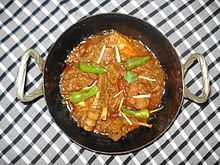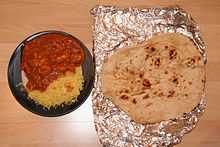Balti (food)
| This article is part of the series |
| British cuisine |
|---|
|
Regional cuisines
|
|
Overseas/Fusion cuisine |
|
|
A Balti (Balti: བལི་, Urdu: بلتی) is a type of curry served in a thin, pressed steel wok-like "balti bowl".[1] It is served in many restaurants in the United Kingdom. The consensus appears to be that the term refers to the pot in which the curry is cooked,[2] rather than to any specific ingredient or cooking technique, although it is stated that it is cooked until the cooking liquid has largely evaporated. [3]
Where the Balti style of cooking originated is uncertain; some believe it to have been invented in Birmingham, England while others believe it originated in the northern Pakistani region of Baltistan in Kashmir from where it spread to Britain.[4]
Origin and etymology
Balti cuisine became known throughout the UK during the 1990s, after initial growth in Birmingham since the 1980s. One school of thought states that name 'Balti' for the food may reflect its origins among the cuisine of an ethnic group living in the Baltistan region of northern Pakistan who are called Balti.[4]
Alternatively, 'Balti' food is named after the pot in which it is cooked. That origin of the word is to do with the Urdu and Hindi word Balty, which means "bucket."[5] As mentioned in the late nineteenth century in Hobson-Jobson, the term 'balti' refers to the steel or iron pot in which the food is cooked or served, taken from the word 'balti', which is derived from the Portuguese word 'balde', meaning bucket/pail, which was taken to South Asia by the Portuguese on their seafaring enterprises in the early sixteenth century. Therefore, originally, the word 'Balti' refers to a bucket, then evolving to its meaning as a cooking pot.
According to Pat Chapman, the food writer, the origins of the word can be traced back to the area of Baltistan, in northern Pakistan, where the people cook in a cast iron wok similar to the Chinese way of cooking (Baltistan shares a border with China). In his Curry Club Balti Curry Cookbook, Chapman states:
| “ | The balti pan is a round-bottomed, wok-like heavy cast-iron dish with two handles.... The origins of Balti cooking are wide ranging and owe as much to China (with a slight resemblance to the spicy cooking of Szechuan) and Tibet as well as to the ancestry of the Mirpuris, the tastes of the Moghul emperors, the aromatic spices of Kashmir, and the 'winter foods' of lands high in the mountains. | ” |
The word was the subject of analysis on the BBC TV series Balderdash and Piffle. A menu from 1982 was cited as the first written reference, with The Curry Club's Curry Magazine Edition 29, winter 1984 answering a reader query about the definition of Balti. Written evidence seems to be scant prior to 1982, and the Oxford English Dictionary and The Curry Club welcome any contributions which will verify the first mention of Balti in Britain.
However, based on the knowledge of people living in Birmingham at the time, Balti cooking originated at Adil's Restaurant in 1977. This restaurant was at the time located in Stoney Lane, Balsall Heath, Birmingham 12. Around 2009, it relocated to 353-355 Ladypool Road, Balsall Heath, Birmingham B12 8LA, where it continues to trade.[6]
Balti houses



Balti restaurants are often known in Birmingham as 'balti houses'. Some balti houses have a sheet of glass on the table top with menus secured underneath.[7] Balti houses often offer very large "Karack" naan bread pieces, meant to be shared by the whole table.[8]
Balti houses originally clustered along and behind the main road between Sparkhill and Moseley, to the south of Birmingham city centre. This area (comprising the Ladypool Road, Stoney Lane and Stratford Road) is still sometimes referred to as the 'Balti Triangle' and contains a high concentration of Balti restaurants, as well as some of the oldest to be found in the city. On 28 July 2005, a tornado caused extensive damage to buildings in the Triangle,[9] forcing many restaurants to close. A clean-up operation ensured most had re-opened by the beginning of 2006.
Balti restaurants have now spread beyond the triangle, and are also based in the south of Birmingham along the Pershore Rd. Lye near Stourbridge to the west of Birmingham has become known as the 'Balti Mile' with up to a dozen restaurants clustered along the High Street.
The food and its style of presentation proved very popular during the 1980s and grew in the 1990s; Balti restaurants gradually opened up throughout the West Midlands and then a large part of Britain. The expanded curry market in Britain is now said to take in 4 billion pounds sterling per annum; but some still claim that it is impossible to get a 'proper' Balti outside the urban West Midlands.
Outside Britain, there are a small number of Balti houses in Ireland and many other English-speaking countries, particularly Canada and Australia.
Since the late 1990s, British supermarkets have stocked a growing range of pre-packed Balti meals and the Balti restaurant sector has since faced increasing competition from the retail sector and from changes in customer tastes, along with other traditional South Asian and Indian restaurants.[10][11]
Bibliography
- Curry Club Balti Curry Cookbook, Piatkus, London — ISBN 0-7499-1214-6 & ISBN 0-7499-1342-8 (1993)
- Modern Balti Curries, above title republished by John Blake Publishing, London (2006)
- Pat Chapman’s Balti Bible, Hodder & Stoughton, London — ISBN 0-340-72858-2 & ISBN 0-340-72859-0 (1998)
- 2009 Cobra Good Curry Guide, John Blake Publishing, London — ISBN 1-84454-311-0
See also
References
- ↑ Richard McComb, Birmingham Post, 20 February 2009
- ↑ "Chicken Balti". UK: The Curry House. Retrieved 19 December 2013.
- ↑ "Balti". The Free Dictionary. Retrieved 19 December 2013.
- ↑ 4.0 4.1 "Baltistan's mystery food". The Hindu. 17 July 2003. Retrieved 18 April 2013.
- ↑ Hobson-Jobson: Being A Glossary of Anglo-Indian Colloquial Words and Phrases, and of Kindred Terms, by Col. Henry Yule and the late Arthur C. Burnell. London: John Murray, 1886, at page 40.
- ↑ "Welcome to Adil — The Home of Balti Cuisine". UK. Retrieved 31 December 2012.
- ↑ birmingham.gov.uk : A Brief History of the Pakistani Community
- ↑ [http://www.independent.co.uk/travel/uk/birmingham--the-latest-hot-destination-for-foodies-525778.html: Birmingham, the latest hot destination for foodies]
- ↑ birmingham.gov.uk : Birmingham tornado
- ↑ [http://www.independent.co.uk/news/has-the-great-british-curry-house-finally-had-its-chips-1070723.html: Has the great British curry house finally had its chips?]
- ↑ [http://chaisamosa.net/index.php/business-update/20090306998/indian-restaurants-urge-british-government-to-help-as-recession-bites/menu-id-386html: Indian restaurants seek government help as recession bites]
External links
- OED Online - Balti
- Birmingham City Council pages about the 'Balti Triangle' in Sparkbrook, Birmingham
| ||||||||||||||||||||||||||||||||||||
